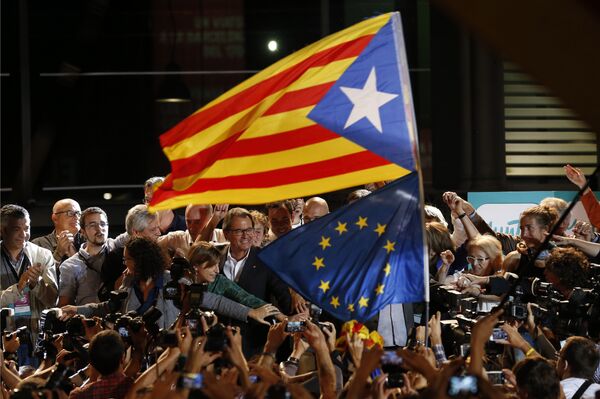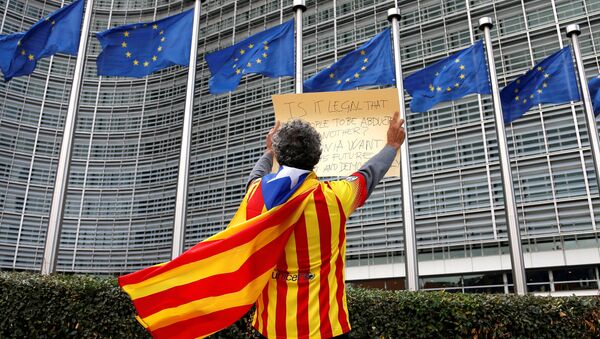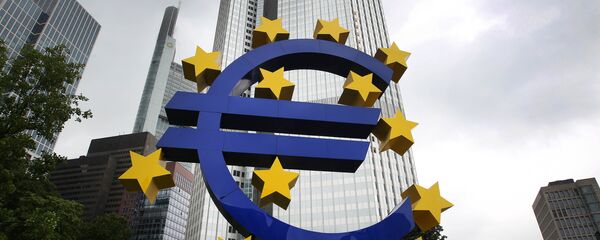Slaying the "nonsense of economics," Professor Steve Keen at Kingston University in London tells it like it is — banks are money factories, money is double entry bookkeeping, and capitalism will not function until we fund innovation over asset bubbles.
Sputnik: Why are so many regions harking toward independence right now? Could there be a ripple effect coming from the economic crisis of 2008?
Steve Keen: If you have inequality being generated in a system, that's what happens. There would be increasing inequality if there was increasing private debt. Workers would pay for the increase in debt, even if they weren't doing the borrowing in the first place. That's what actually happened — so inequality is going to lead to more and more tension. Particularly with inequalities leading to an economic crisis, you then have that amplified in Europe by the development of the euro, followed by a plague of the most extreme myths ever to be applied by a capitalist economy.
Because those myths failed abjectly, we have unemployment rates in the Mediterranean countries — particularly in Spain and Greece — which had great depression levels. If you're part of a region or a nation where there are some tensions to begin with, and then the national government are imposing policies and economic deprivation on you, then of course there are going to be people saying, "let's get out of this whatever it might be."
I think that's what's happening in Catalonia and in Northern Italy as well.

Really, separatist movements occur because the Union that we are a part of is working badly.
Sputnik: The economic centers have been known to flee at the first sign of political unrest — to what extent could these be empty threats, designed to unbalance secessionist motives?
Steve Keen: Bank themselves could leave, but then it comes back to this question — what are banks?
We tend to think that banks are institutions without which we are unable to create any more money. Banks are one of two ways of creating money, they're not warehouses that store our money, and if they leave, then they'll take our money away. They are money factories.
If the banks threaten to leave, you can create your own banks. These might be community banks, which are more directed towards investment in Scotland, rather than speculation, and you can create money with your own government as well, but you have to be willing.
One thing I've got to say that's critical about the Scottish independence movement — I saw the SNP [Scottish National Party] documents before the referendum, and there was no consideration about the monetary impact of leaving Britain. If you do it, you've got to form your own currency. The worst thing you can possibly do is adopt the euro. I still think that that particular issue has not been properly addressed by independence movements in Scotland.
Sputnik: If a newly independent republic is able to rejoin or join the European Union, as was the case with the Republic of Ireland, would this always correlate with economic prosperity?
Steve Keen: No, because the euro's an incredibly badly designed monetary system. Only a bunch of people who don't understand money could ever design the euro.
The reason it just doesn't make sense as an economic model is that the euro is designed around the problems caused by too much government debt.
The creation of money is two-fold; the governments make money by spending more than they make in taxation, some governments print their own money, quite capable of financing it, because it owns its own bank. So they're paying interest on a debt that is fundamentally owned by its own bank. It's the only institution in society that can do that. On the other side private banks make money by paying out more than they get back in repayments.
If you have a government that's effectively deciding not to create enough money by putting limits on how much it creates, then if there's a desire in the economy to grow faster than the rate of growth, it's actually increasing supply by running a deficit. People will go and borrow money from the banks. When they borrow money from the banks, often the banks will do it to finance a property bubble.
Banks used to do it to finance research and innovation, they don't do that anymore.
If you've got a property bubble game, everyone feels fantastically wealthy until the bubble bursts, and willingness to earn from banks evaporates, because so many people are over-leveraged. The willingness to take on more debt stops. They can't even get the money for a deposit together unless the banks start giving 20% loans, and that's insane — then you have a crash.
If you look at the amount of household debt in Ireland from 2000, to the prices in 2008 or 2009, they rose from about 60 GDP to 100%, and then it came down from 120% to 60 again. It looks like a bloody Pyramid of Giza when you look at the data. That's a boom and a crash caused by the private monetary system, which the designers of the euro completely ignored.
On top of that, they also said you can't have fiscal policy when you have the huge trade imbalances. These are caused by fixed exchange rates with a country like Germany, which maintains a low rate of inflation, in comparison to other countries with slightly higher rates of inflation.
Take a look at Italy — it runs an average rate of inflation of about 3%, Germany runs 1%. Every year Germany gets 2% more price-competitive with Italy — and ultimately Italian industry disappears. German industry takes over, and you get poverty inflicted on those not maintaining the rigid inflation targets that Germany has set. You get a deflated economy.
So the euro is an insanely badly designed system, and the last thing you should think of joining.
Sputnik: How can nations hoping for independence avoid a financial crisis?
Steve Keen: They've got to realize what money is — and this is the crazy thing! One of the most important models in capitalism is economic theory, and most economic theory assumes a barter system.
When you consider money, it's fundamentally created by double entry bookkeeping. A bank says: "That's a great idea! You can buy that house in Edinburgh for £200,000 (US$263,000). Here's £200,000 in your deposit account which you'll pay to the vendor, and by the way you owe us £200,000."
It's an accounting operation. The same thing applies for the government.
Here, I'll give you 200 billion pounds, which is what they gave the financial sector in 2010, in return for 200 billion pounds worth of bonds, which we've previously generated, and nobody pays quantitative easing tax. People think that governments have to tax before they can spend, but that was 200 billion pounds — virtually one eighth of the economy in one year.
Once we understand that it's an accounting operation, it's easier to say, "ok we can use the governments accounting capacity to create money, and the limits are the things like inflation, unemployment and so on." Rather than limiting on the fact that the government does not have the physical money, you also have to consider that should banks create money, they should be creating it for decent enterprises, not for property speculation. Well, they can get away with financing asset bubbles, but not with financing innovation, entrepreneurs, and working capital which is what they should be doing.
Once we get that right we can have a better functioning capitalist economy.





